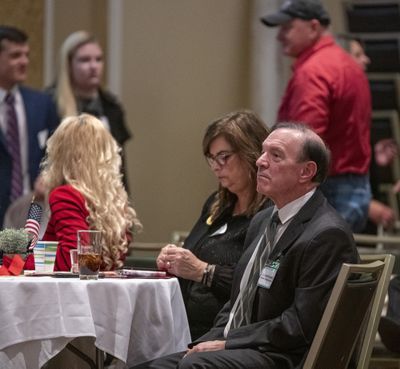Prosecutor asks judge to recuse himself in Spokane cases after he wrote that Black man’s now-overturned conviction was indicative of racism

Spokane County Prosecutor Larry Haskell is fighting back against an appellate judge who has accused him and his office of being racist.
Haskell’s office has asked Division III Court of Appeals Judge George Fearing to recuse himself from all criminal appeals involving Spokane County agencies and assault victims last month after Fearing wrote an 80-page unpublished opinion in a now-overturned case, calling the arrest indicative of racism in Spokane County.
Fearing, who presides over the Division III Court of Appeals that handles most Eastern Washington cases, wrote the 80-page opinion earlier this year detailing what he called the systemic racism inherent in the case.
Haskell has faced many accusations of racism, particularly after his wife declared herself to be a “proud white nationalist” on social media.
In August 2019, Darnai L. Vaile, now 26, was arrested after a woman called from Peking Palace in Spokane Valley saying Vaile kissed her without her permission.
Vaile was not charged with anything related to the unwanted kiss, but with two counts of third-degree assault against two deputies. He was convicted on those charges, but the conviction was overturned by a panel of three judges, including Fearing, on the appeals court this spring based on the panel’s disagreement with Spokane County Superior Court Judge Tony Hazel that a video of Vaile’s arrest was inadmissible.
Fearing dissented from his colleagues, saying racism permeated the case. This is not the first time that Fearing penned a passionate dissent defense on racial issues. In 2021, he was highly critical of racist covenants on properties throughout Spokane County.
When Fearing’s dissent became public, current and former sheriffs of Spokane County, along with Haskell’s office, called the claims of racism inappropriate, inaccurate and disrespectful to law enforcement and women who are victims of assault.
Chief Criminal Deputy Prosecutor Preston McCollam further spelled out the prosecutor’s office’s specific disagreements in his 11-page letter, arguing that Fearing can no longer be viewed as impartial based on his dissent.
“I acknowledge and embrace the fact that racism has no part in our society or system of justice, and it is incumbent on all involved in the criminal justice system to strive for justice and equality for all,” he wrote. “Baseless accusations of racism and bigotry have no place in an impartial judiciary and only serve to further promote hate and greatly erode public trust at the expense of honorable men and women in our community.”
McCollam further noted that many of the race-related issues Fearing addressed in his dissent were not brought up at trial, something the majority of judges also noted in their opinion.
“Judge Fearing raised these issues on his own initiative relying on sources outside the record to impute racist motivations to every participant in this litigation,” McCollam wrote.
Fearing took aim at Haskell directly, criticizing him for not taking a tougher stance against Haskell’s wife’s racist postings, which he called “the elephant in the room.” That included using the N-word to describe MSNBC host Joy Reid, who is Black, and using racial slurs for Chinese people, white people, Latinos, Jews and gay people, as well as referring to herself as a “proud white nationalist.”
In the past, Haskell has apologized for his wife’s comments, saying they do not reflect the views of his office.
Haskell’s wife, Lesley Haskell, continues to post racist and conspiracy theory-laced posts on social media.
She reposted a photo on X, the social media platform formerly known as Twitter, in July of Congresswoman Alexandria Ocasio-Cortez with “If you believe that black people can’t make it without extra help from the government. Maybe it’s you who’s the racist.”
McCollam did not directly address the personal side of Fearing’s dissent, but did argue that Fearing’s personal opinions of his office and law enforcement “inject outside and historical racial considerations into areas where the specific facts do no support his narrative.”
McCollam goes on to accuse Fearing of making decisions based on people’s race.
“The bias and prejudice shown by Judge Fearing demonstrate that he does not care about the actual conduct or actions of an officer, deputy, prosecutor or judge in any particular case and instead is prepared to impute malice based simply on who the parties are or what color they are,” McCollam writes in the conclusion.
McCollam copied 12 other agencies on his letter, including local law enforcement, the state association of prosecuting attorneys, state office of public defense and local public defender’s offices.
On Aug. 9, Fearing responded saying he will temporarily recuse himself from all criminal appeals in which the Spokane prosecutor’s office represents the state.
The temporary recusal is to give “other interested parties” time to give their perspectives on the issue. Fearing CC’d the Spokane County Public Defender’s Office, Councel for Defense and Office of Public Defense.
Fearing declined to comment on his request for responses. He gave interested parties until “mid-September” to respond.
In an email, McCollam called Fearing’s request for responses from other parties “rather unusual.”
“Judge Fearing has indicated exactly how he feels about Spokane law enforcement, prosecutors, and crime victims and went on to make sweeping statements about how minorities suffer at the hands of our local law enforcement,” McCollam wrote. “And in the face of his clear and admitted bias against law enforcement he has now … invited others to weigh in on his clearly stated partiality.”
The Spokane Police Department, sheriff’s office, public defender’s office and Councel for Defense all said they plan to file responses.